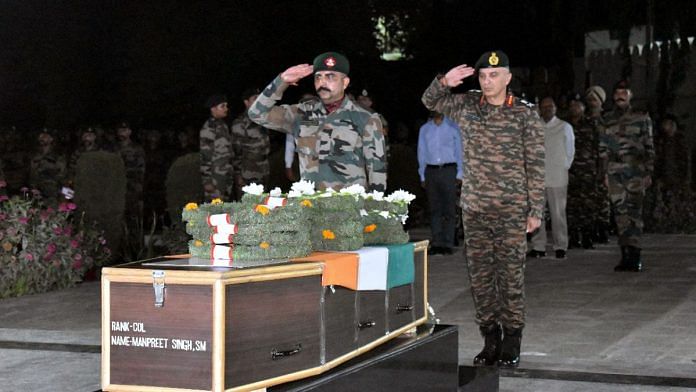I have two videos in front of me. In one, Pakistani cricketer Shaheen Shah Afridi is presenting a gift to Jasprit Bumrah to celebrate the birth of the Indian cricketer’s child. Bumrah’s gratitude is palpable.
The other video features Ghulam Hassan Bhatt, a distinguished veteran of the Jammu and Kashmir Police, placing a wreath in honour of his 29-year-old son, DSP Humayun Bhat. Humayun was killed in an ambush, confronting Pakistan-backed terrorist group Lashkar-e-Taiba (LeT) in Kokernag, Kashmir. He leaves behind a young family, including a baby who is only a month old.
According to some Indians, these are two distinct episodes that should not be intertwined. One involves Afridi’s thoughtful gesture towards Bumrah and the other is the heart-wrenching sight of a father receiving the coffin of his son.
I’ve been told that sports and politics should remain separate entities. It’s suggested that the sacrifice made by Bhat, Colonel Manpreet Singh, and Major Ashish Dhonchak, all leaving behind young children, should not be intertwined with the world of sports.
Also read: Terrorists’ brazen new strategy in J&K: Ambushing security forces with body cameras on
Issue of Kashmir
The recent terrorist attacks in Jammu and Kashmir can inadvertently disrupt the camaraderie among the sportstars of India and Pakistan. Some may question the perceived conflict within me, wondering why I choose to blend these two distinct spheres.
My question is rather straightforward: Isn’t it true that India has, in many ways, borne the consequences of Pakistan’s foundational ideology? Pakistan’s inception was driven by the belief that Hindu-majority secular India was inherently unsafe for Muslims. This conviction led to the creation of an Islamic Republic of Pakistan, founded on the principle of the supremacy of Islam over other religions. As a result, this ideology has become deeply ingrained in Pakistani society.
What India and the broader international community categorise as “terrorist groups,” such as LeT and Jaish-e-Mohammed, are often perceived quite differently within Pakistan. In the eyes of the Pakistani state, these groups are often seen as “freedom fighters” and “mujahids” battling against what they perceive as the oppression from non-believers or “kaffirs”. This perspective is troublingly consistent, regardless of whether the “kaffirs” in question are Sikh, Hindu, or Muslim, as evidenced by the tragic killings of the three Army officers in Kashmir.
As per findings from Pew Research, a substantial majority of Pakistanis, 88 per cent, view the Kashmir dispute as a highly significant issue. Moreover, 69 per cent of Pakistanis view India as a major threat to their nation, surpassing even the concern over the Taliban (57 per cent). This raises important questions about the deep-rooted and complex narratives that shape the relationship between India and Pakistan.
Also read: Jihadist hate can thrive in prison. The story of a cook, a guitarist & a Sufi shows how
Track record of terrorism
It’s crucial to underline the stark contrast between India and Pakistan in this regard. India does not harbour or support terrorist groups, while Pakistan has a distressing history of sheltering and employing numerous such groups as instruments of its foreign policy.
Given that terrorism is not a part of our policy, India should employ alternative diplomatic methods. For example, the Board of Control for Cricket in India (BCCI) contributes a significant share of revenue to the International Cricket Council (ICC), as highlighted by former Pakistani cricketer Ramiz Raja. He said that the Pakistan Cricket Board (PCB)’s stability is highly dependent on India’s cooperation, given that a substantial 90 per cent of the ICC’s funding is derived from India. However, the BCCI is unlikely to leverage its influence to retaliate against the PCB. This is primarily because they don’t assign a value to the lives of our soldiers, because potential monetary gains in billions outweigh the reasons to internationally boycott PCB.
But as an Indian citizen, it’s important to raise the question: why should a nation with a history of religious discrimination and a track record of terrorism against India be permitted to operate without facing consequences? This dilemma underscores the broader issue of whether sports and politics should be entwined.
It’s worth highlighting that Pakistani players, including Shaheen Afridi’s famous father-in-law Shahid Afridi, has fervently supported the so-called “liberation” of Kashmir from secular India. Former cricketer Shoaib Akhtar endorsed the two-nation theory and Pakistan’s former Prime Minister Imran Khan, who was also a cricketer, championed the Kashmir cause and criticised India over the treatment of its Muslims. These cricketers have repeatedly introduced deeply political elements into the world of sports.
Sorry for mixing sports with politics, enjoy your next cricket match with Pakistan.
Amana Begam Ansari is a columnist and TV news panelist. She runs a weekly YouTube show called ‘India This Week by Amana and Khalid’. She tweets @Amana_Ansari. Views are personal.
(Edited by Ratan Priya)




i would like that the that you be knew Sotong target india suspect criminal Sotong moment